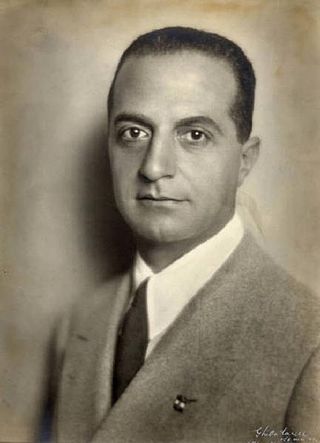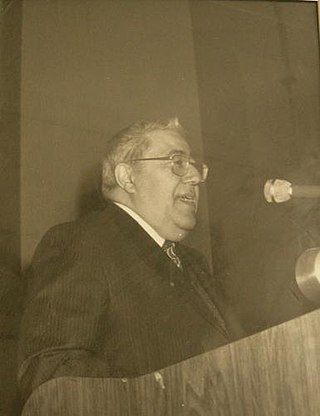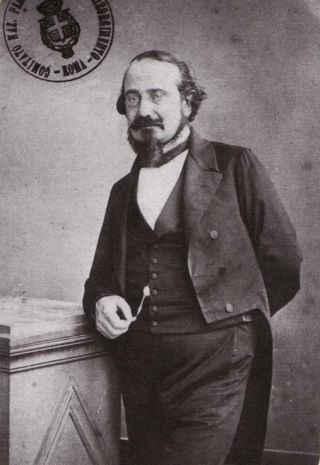
Giacomo Matteotti was an Italian socialist politician and secretary of the Partito Socialista Unitario. He was elected deputy of the Chamber of Deputies three times, in 1919, 1921 and in 1924. On 30 May 1924, he openly spoke in the Italian Parliament alleging the Italian fascists committed fraud in the 1924 general election, and denounced the violence they used to gain votes. Eleven days later, he was kidnapped and killed by the secret political police of Benito Mussolini.

Giuseppe Bottai was an Italian journalist and member of the National Fascist Party of Benito Mussolini.

Gianfranco Pasquino is an Italian political scientist.

Alessandro Barbero is an Italian historian, novelist and essayist.

The Academia della Farnesina, also known as the Accademia fascista maschile di educazione fisica or Accademia fascista della Farnesina, was a centre for sport and political education in Fascist Italy.

Giuseppe Cobolli Gigli was an Italian engineer and politician. From 1935 to 1939, he was member of Benito Mussolini's Italian fascist government as minister of public works.

Enzo Giudici was an Italian academic who specialized in French Renaissance literature, particularly Louise Labé and Maurice Scève. Giudici was also a publicist often compared with fascism.
Sansepolcrismo is a term used to refer to the movement led by Benito Mussolini that preceded Fascism. The Sansepolcrismo takes its name from the rally organized by Mussolini at Piazza San Sepolcro in Milan on March 23, 1919, where he proclaimed the principles of Fasci Italiani di Combattimento, and then published them in Il Popolo d'Italia, on June 6, 1919, the newspaper he co-founded in November 1914 after leaving Avanti!

Ines Donati was a political activist and a supporter of the first wave of Italy's Fascist movement.

The Sandro Italico Mussolini School of Fascist Mysticism was established in Milan, Italy in 1930 by Niccolò Giani. Its primary goal was to train the future leaders of Italy's National Fascist Party. The school curriculum promoted Fascist mysticism based on the philosophy of Fideism, the belief that faith and reason were incompatible; Fascist mythology was to be accepted as a "metareality". In 1932, Mussolini described Fascism as "a religious concept of life", saying that Fascists formed a "spiritual community".
Fascist mysticism was a current of political and religious thought in Fascist Italy, based on Fideism, a belief that faith existed without reason, and that Fascism should be based on a mythology and spiritual mysticism. A School of Fascist Mysticism was founded in Milan on April 10, 1930. Active until 1943, its main objective was the training of future Fascist leaders who were indoctrinated in the study of various Fascist intellectuals who tried to abandon the purely political to create a spiritual understanding of Fascism. Fascist mysticism in Italy developed through the work of Niccolò Giani with the decisive support of Arnaldo Mussolini.

Bertrando Spaventa was a leading Italian philosopher of the 19th century whose ideas had an important influence on the changes that took place during the unification of Italy and on philosophical thought in the 20th century.
Mario Rosa was an Italian historian.
The Right group, later called Historical Right by historians to distinguish it from the right-wing groups of the 20th century, was an Italian conservative parliamentary group during the second half of the 19th century. After 1876, the Historical Right constituted the Constitutional opposition toward the left governments. It originated in the convergence of the most liberal faction of the moderate right and the moderate wing of the democratic left. The party included men from heterogeneous cultural, class, and ideological backgrounds, ranging from British-American individualist liberalism to Neo-Hegelian liberalism as well as liberal-conservatives, from strict secularists to more religiously-oriented reformists. Few prime ministers after 1852 were party men; instead they accepted support where they could find it, and even the governments of the Historical Right during the 1860s included leftists in some capacity.

Stefano Rodotà was an Italian jurist and politician.
Mauro Canali is a full professor of contemporary history at the University of Camerino in Italy. He is considered to be one of the most important scholars of the events leading to the crisis of the liberal Italian state and the rise of fascism. He has also researched and published extensively on the totalitarian structure of Mussolini's regime, its repressive mechanisms and its system of informants. He studied under Renzo De Felice, and has published in the Journal of Modern Italian Studies, the Italian dailies la Repubblica and Cronache di Liberal.

Marco Tarchi is an Italian political scientist. He is currently full professor of Political Science, Political Theory and Political Communication at the Cesare Alfieri School of Political Sciences of the University of Florence. His research is focused primarily on populism, democracy, political organization, and extreme right.
Nino Valeri was an Italian historian.

Federico Rampini is an Italian journalist, writer, and lecturer who holds both Italian and American citizenship. He served as deputy editor of Il Sole 24 Ore, and has worked as chief foreign correspondent for La Repubblica since 1997. He has been residing in the United States since 2000. He is the 2019 recipient of the Ernest Hemingway Prize.
Salvatore Lupo is an Italian historian and author from Siena, specializing in the Sicilian Mafia.













